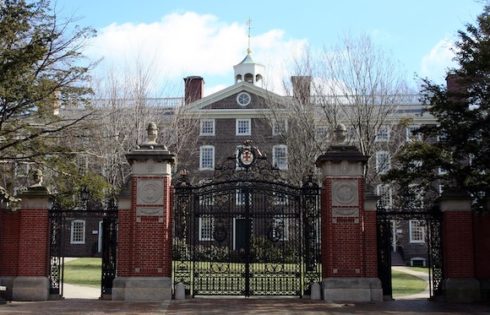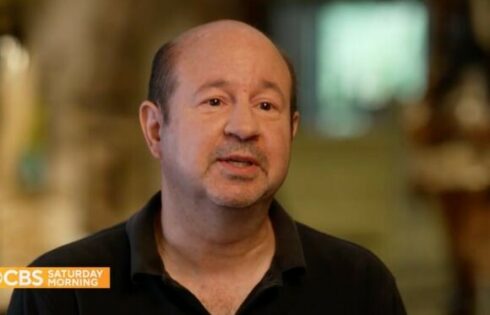
Democratic attorneys general claim cross-examination causes ‘less reliable outcomes’
The ACLU’s lawsuit against the Department of Education’s new campus sexual misconduct rules threatens the First Amendment rights of students and faculty, according to a “motion to intervene” submitted by three free speech organizations.
Though the ACLU claimed the new Title IX regulation would create a “second-class standard for reports of sexual harassment and assault,” it aims to reinstate an unconstitutional definition of sexual harassment, according to the Foundation for Individual Rights in Education, Independent Women’s Law Center and Speech First.
Eighteen Democratic attorneys general followed the ACLU’s lead with their own lawsuit against the department’s new rules, claiming they will cause “immediate and irreparable harm” to their states, schools and communities.
The rules will impose “complex, courtroom-like procedural requirements that demand significant hiring, training, and other resource commitments from schools,” ultimately making them “less safe,” according to the AGs’ motion for a preliminary injunction. One of their targets: cross-examination, which will “lead to less reliable outcomes.”
The American Council on Education, which represents 1,700 colleges, and 24 other higher education organizations filed a friend-of-the-court brief in the AGs’ lawsuit.
It argues that the Aug. 14 implementation date for the new Title IX rules will cause “irreparable harms” to colleges because they are already strained responding to the COVID-19 pandemic. (The proposed rules were presented for public comment more than a year and half ago.)
While the free speech organizations’ motion focuses heavily on the so-called Davis standard – a three-part test devised by the Supreme Court for judging harassment in schools – the ACLU’s lawsuit only mentions it once.
The AGs’ lawsuit, meanwhile, accuses the Department of Education of misreading the Davis standard so that it produces “absurd and arbitrary results” for students who report sexual misconduct.
Brooklyn College Prof. KC Johnson, who chronicles Title IX litigation, accused the Democratic AGs of “misrepresenting” recent precedents from multiple federal appeals courts on sexual misconduct proceedings. The lawsuit is full of “hot language” but little evidence, he said.
MORE: ACLU says following SCOTUS precedent makes victims ‘second-class’
To summarize, 18 Dem AG's file complaint to block TIX regs:
–claiming x-examination leads "to less reliable outcomes";
–objecting to x-exam by lawyers;
–misrepresenting CA6 and CA7 precedent on this issue.https://t.co/kgaN0pgHve— KC Johnson (@kcjohnson9) June 24, 2020
Trump administration doesn’t say its standard is ‘required’ by First Amendment
The federal court hearing the ACLU’s lawsuit should let the free speech organizations intervene so they can “advance a legal theory that the Department of Education will not”: that the agency’s previous standard for sexual harassment is unconstitutional, they argued. (Contrary to a friend-of-the-court brief, a motion to intervene is intended to protect an outside party’s own interests in the litigation.)
Prior to the Trump administration, the department said any one element of the three-part Davis standard – “severe, pervasive, and objectively offensive” – could qualify as sexual harassment that schools must address, rather than requiring all three. It also included “persistent” behavior that was not “objectively offensive,” according to the brief.
While it imposed the Davis standard in the new regulation, even the Trump administration “stops short of saying” the three-part test “is required by the First Amendment,” as do the free speech organizations. FIRE and IWLC made the same argument when the department was accepting public comment on its proposed Title IX regulation, they note.
Any reversion to the previous, broader standard, which the ACLU seeks, is thus a violation of the First Amendment.
With Davis written into binding regulations, FIRE specifically hopes to “reduce the frequency with which universities attempt to punish free speech on sensitive issues” such as gender and sex. Speech First also would like to pare back its legal challenges to harassment policies.
MORE: 3rd Circuit opens the door to anti-male bias lawsuits against universities
If the court upholds the Title IX regulation, the free speech organizations can shift their resources to other pressing matters on college campuses, the motion says.
It warns that if the court doesn’t adopt the three groups’ position, a future Department of Education could “abandon its current position” on Davis, since it considers that standard “one of a range of approaches that are permissible under Title IX.”
The court should also consider that the free speech groups might file their own litigation if they aren’t allowed to intervene in the ACLU suit. FIRE and Speech First “regularly challenged universities’ harassment policies in court” before the Title IX regulation was finalized.
If the court agrees with their reasoning, and most universities comply so they don’t risk federal funds, the groups “can reduce the number of lawsuits they file” and save “substantial resources for the judicial system as a whole,” the motion says.
Supreme Court standard only meant to cover ‘liability for monetary damages’
The separate lawsuit was filed by the attorneys general from Pennsylvania, New Jersey, California, Colorado, Delaware, D.C., Illinois, Massachusetts, Michigan, Minnesota, New Mexico, North Carolina, Oregon, Rhode Island, Vermont, Virginia, Washington and Wisconsin.
The Democratic AGs object to narrowing the definition of sexual harassment so that only the three-part Davis standard qualifies as “unwelcome conduct.”
They argue that the department has consistently interpreted Davis as only applying to proceedings “in which private parties could obtain damages,” not limiting its authority to “administratively enforce Title IX.”
Under the new regulation, students who report sex-based discrimination will have fewer protections than those who report discrimination under Title VI – on the basis of race, color or national origin – even though the statutes are otherwise “near-identical,” the AGs say:
The Department undermines Title IX and exceeds its own authority by proscribing recipient school’s ability to act on sexual harassment complaints only at the point where the complaints would rise to the level of liability for monetary damages.
The Democratic AGs claim that the new rules establish a grievance process that is “arbitrary and capricious,” and not just because the Aug. 14 implementation date would force schools to “reallocate resources” away from COVID-19 preparations and toward Title IX overhaul.
Democratic attorneys general claim cross-examination “lead[s] to less reliable outcomes” in Title IX challe… by The College Fix on Scribd
MORE: 6th Circuit tells universities to watch ‘My Cousin Vinny’
They impose “unlawful requirements on K-12 schools,” including advance written notice before interviews, evidence-sharing with all parties, a “separate decision-maker” to provide each party with the “opportunity to submit written questions and follow-up questions,” and a final written determination.
Yet school administrators “must often act quickly, sometimes within the hour, to stop sexual harassment incidents before they escalate and cause trauma,” the suit says, denouncing the “unnecessary bureaucratic steps” imposed by the new rules.
The Democratic AGs also say the “live-hearing requirements on postsecondary schools” are “unreasonable” because they resemble a courtroom.
They claim that “ample evidence” shows that “direct, oral cross-examination by an advisor will chill reporting, create potentially inequitable and traumatizing hearings that can harm complainants and respondents alike, and lead to less reliable outcomes.”
Johnson, the professor who chronicles Title IX litigation, said their cited evidence didn’t even apply to college students: two New Zealand studies of children, who are not subject to cross-examination in the new regulation, and a law review article criticizing a Supreme Court decision that invalidated part of the federal Violence Against Women Act.
The lawsuit also ignores two major appeals court rulings in favor of cross-examination in college proceedings, he added: from the 6th U.S. Circuit Court of Appeals and the 3rd Circuit.
MORE: DeVos cites ACLU to justify Title IX regulatory changes
AG's citation for this remarkable proposition: a law-review article, and two articles about x-exam & children. (The rule doesn't require x-exam for K-12 schools.) Neither the CA6 Baum nor the CA3 USciences decision is cited in the complaint. pic.twitter.com/i6dUAMU7ul
— KC Johnson (@kcjohnson9) June 24, 2020
Shouldn’t be enforced even if COVID-19 never happened
The AGs note that the new rules are narrower than those under Title VII, “which protects school employees—including student workers—from discrimination on the basis of sex.” This standard is “severe or pervasive” harassment, as opposed to the three-part Davis test.
“The Department fails to adequately explain why students—and especially young children— should be subjected to more egregious physical or verbal mistreatment to have an actionable claim of harassment than adults in a workplace,” the suit says.
By limiting “quid pro quo harassment” to misconduct by an “employee,” the new rules would also allow “students in positions of authority,” such as teaching assistants, to “condition[] grades on sexual favors,” the suit says. The “same conduct by a teacher,” however, “would violate Title IX.”
The Democratic AGs are alarmed that the new rules limit sexual harassment complaints to those who are “participating in or attempting to participate in the education program or activity” at the time of their complaint.
They claim this exceeds the department’s authority and has the perverse effect of prohibiting a school from investigating “if the victim left the school before filing a formal complaint––even if the victim left the school because of the sexual harassment.”
The 25-party brief led by the American Council of Education calls for a preliminary injunction specifically because of “the COVID-19 global pandemic.” Institutions of higher education cannot adequately comply with the new Title IX rules since they would divert resources away from those “mission-critical demands.”
Even if the times were normal, the amount of work that individual schools would need to take – to re-draft various materials, renegotiate employee contracts and re-train personnel to comply with “highly technical legal standards” – warrants a preliminary injunction, they argue.
The Aug. 14 date imposes needless “hardship and confusion” on administrators, faculty, and students as they prepare for fall semester amid COVID, the brief says. They will suffer “immediate and extraordinary harms” if colleges have to “reallocate increasingly scarce resources toward this massive new regulatory regime.”
MORE: Due process advocates cheer overlooked changes in Title IX regulation
IMAGE: Jeff C/Flickr
Like The College Fix on Facebook / Follow us on Twitter






Please join the conversation about our stories on Facebook, Twitter, Instagram, Reddit, MeWe, Rumble, Gab, Minds and Gettr.